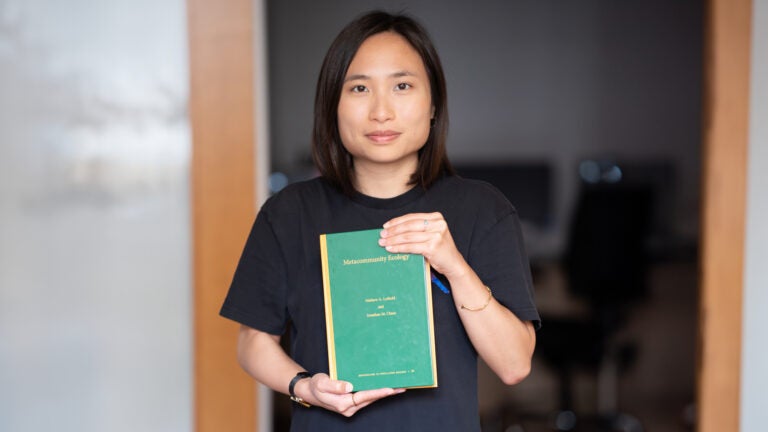
2024 Wrigley Institute Graduate Fellow Jenny Cheung studies metacommunity theory, which explores how species interact and coexist in different habitats (Nick Neumann/USC Wrigley Institute)
Unraveling the Mysteries of Biodiversity: My Journey into Metacommunity Theory
Hey there! I’m a second-year Ph.D. student in ecology at USC, working under the guidance of Dr. Melissa Guzman in the Ecological Data Science Lab. My research focuses on understanding how different species coexist and interact within various habitats, a fascinating field known as metacommunity theory. I wanted to share what inspired me to dive into this area, what my research is all about, and how it connects to real-world issues. Plus, I’ll talk about some surprising findings and the amazing support I’ve received from my fellowship.
Growing up, I was always that kid who was fascinated by nature and the incredible diversity of life around us. This curiosity led me to study biology in college, where I was introduced to the complex and interconnected world of ecosystems. I was especially drawn to questions about how species form communities and how these communities function and persist over time. This passion drove me to pursue a Ph.D. in ecology, where I could dig into these questions using metacommunity theory.
My research, which is funded by the Wrigley Institute Graduate Fellowship, aims to understand the dynamics of biodiversity across a network of lakes in Sweden. I specifically examine how tiny phytoplankton species interact and move around these lakes. By examining these microscopic organisms, I can uncover broader patterns and processes that govern biodiversity in aquatic ecosystems.
So, what exactly is metacommunity theory? It looks at how local communities of species are connected through processes like dispersal (that’s when species move from one place to another) and environmental filtering (how different species thrive or fail depending on the local conditions). By studying these connections, I hope to reveal how species diversity is maintained and how different species contribute to the overall health of ecosystems.
One of the significant issues in ecology today is biodiversity loss due to habitat fragmentation and environmental change. Things like urbanization, deforestation, and climate change are drastically altering habitats. It’s crucial to understand how these changes affect species and their interactions. My research tackles this issue by providing insights into how species move and interact across landscapes, which can inform conservation strategies.
For example, understanding how species disperse and interact in fragmented habitats can help us design protected areas and corridors that promote biodiversity and ecosystem resilience. Even in urban areas, insights from my research can guide the creation of green spaces that support ecological health.
Urbanization, deforestation, and climate change are drastically altering habitats. It’s crucial to understand how these changes affect species and their interactions. My research tackles this issue by providing insights into how species move and interact across landscapes, which can inform conservation strategies.
Throughout my research, I’ve encountered several surprising findings that have reshaped my understanding of ecological dynamics. One of the most intriguing insights is the significant role of dispersal in maintaining species diversity. I’ve found that even species in less-than-ideal habitats can persist if they receive enough individuals from nearby, more suitable habitats. This highlights the importance of connectivity in ecological conservation.
I’ve also learned that urban environments, often seen as biodiversity deserts, can support various species if designed with ecological principles in mind. Green spaces and urban gardens can serve as crucial refuges for many species, showing that cities can play a significant role in biodiversity conservation.
The Wrigley Institute Graduate Fellowship has been a game-changer for me. It’s provided not only financial support but also opportunities for professional growth and collaboration. Through the fellowship, I’ve been able to participate in workshops and connect with other researchers and professionals who are working on sustainability. These experiences have broadened my perspective and equipped me with new tools and methodologies to advance my research.
My journey into metacommunity theory has been driven by a deep fascination with biodiversity and a desire to contribute to its conservation. Through my research, I aim to uncover the intricate dynamics of species interactions and inform strategies to protect our planet’s precious ecosystems. The support of the Wrigley Fellowship has been invaluable, allowing me to pursue this important work and grow as a scientist. I look forward to continuing this journey and sharing more discoveries.
Jenny Cheung is supported by the USC Dornsife Wrigley Institute Graduate Fellowship.